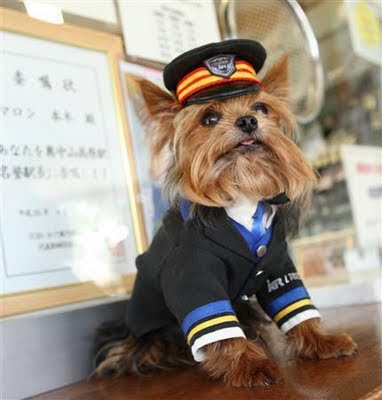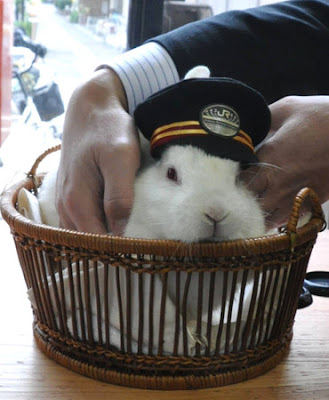
It all began when a cat named
Tama was appointed stationmaster of a railway station in rural Japan. And then the wheels came off the cute wagon.
Eager to cash in on what turned out to be a money-making bonanza, other railway stations jumped on the animal-as-stationmaster bandwagon. They appointed cats, dogs, goats and rabbits as honorary employees at railway stations across the country.
But what started out as a cute copycat move has corkscrewed down into a lazy and unimaginative gimmick now that railway officials are appointing lobsters as stationmasters. Seriously.
Lobsters. The animal-as-stationmaster craze has officially jumped the shark.
Who knew that such a heart-warming tale would end on such a dark note?
It all began innocently enough. Five years ago, several Japanese railway lines went from being manned to unmanned in an effort to cut costs. Railway officials selected local businesspeople to serve as honorary stationmasters.
At
Kishi station in the Japanese town of Kinokawa, a local grocer was appointed stationmaster. A stray cat took up residence outside the empty ticket booth and the grocer would feed her while going about his stationmaster duties. Tama the cat became a regular fixture at the station. Her friendly personality made her a hit with the locals, who would stop and pet her on their way to work.
The cat's popularity caught the eye of the railway officials. For fun, they decided to name her honorary stationmaster in 2007. The cat was given an office (a ticket booth containing a litter box), a uniform (a cute little hat and collar), a salary (free cat food), and a job (greet passengers as they come in and out of the station). The story made headlines across the country and
Tama the cat became an overnight celebrity in cute-crazed Japan.
Japanese tourists flocked to the tiny train station to pose for photos with Tama. The cat became so famous that the railway had to hire a human employee to assist her. A shop at the station started to sell a variety of Tama-branded souvenir goods, including buttons, snacks, and a special photo book. According to the Japan Times, the cat has attracted tourists from across the country and boosted the local economy by
1.1 billion yen.
Last year, Tama was promoted to corporate executive of the Wakayama Electric Railway Co. (making her the company's
highest-ranking female executive).
It's the stuff American dreams are made of: one day you're nobody, the next day you're somebody. Or, in this case, one day you're a stray cat, the next day you're at the top of the transportation industry.

In an attempt to cash in on the success of Tama, other unmanned railway stations in Japan jumped on the animal-as-stationmaster bandwagon. There are now several cat stationmasters and at least two dog stationmasters, with the latest being a fluffy Akita named
Wasao.

Wasao reports for duty at Ajigasawa station in Aomori Prefecture. His job is to help boost the local tourism industry, which has been suffering since the March 11 earthquake and tsunami.
The other dog stationmaster was a Yorkshire terrier named Maron, who worked at a small railway station in northern Japan. Unfortunately, Maron passed away from bronchitis in 2009 -- you can view pictures of his funeral
here.

This is where the story starts to get weird. Because it was no longer novel to appoint a cat or a dog as stationmaster, other stations had to get creative in order to generate both headlines and revenues of their own. So in an attempt to one-up the kitties, the next animal to be appointed to the role of stationmaster was a goat called
Koma.

Koma reports for duty at Uzen-Komatsu station in Yamagata Prefecture. The goat stationmaster worked out so well that a station thousands of kilometres to the south stole the idea and appointed a goat named
Taro to greet passengers in Fukuoka.

But the novelty of goat stationmasters was starting to wear off so the next animal to work the railroad was a rabbit. At Unomachi station in Ehime prefecture, railway officials chose a rabbit named
Tsubasa to fill the position of honorary stationmaster. According to a news report, the railway station is the only one in Japan that contains the Chinese character for "rabbit" in its name. So a rabbit was the obvious choice.

It didn't take long for another Shikoku railway to rip off the rabbit idea. Yamagata Railway also named a rabbit as stationmaster and lined its gift-shop shelves with a stuffed bunny so cute your brain will melt just looking at it.


This is when things started to go horribly wrong. With all of the cute, domesticated animals spoken for, other railways took the animal-stationmaster trend one step too far. It stopped being cute with the appointment of
two baby monkeys.

Nehime and Rakan were named stationmasters at Hojo-cho station in Hyoto prefecture. The monkeys were donated by a local resident, who was concerned about the railway's decreasing ridership and poor finances. The railway hoped the monkey stationmasters would help attract publicity and riders to the line's first biodiesel-fueled train.
It gets worse. Officials at JR Ibusuki Station in Kagoshima prefecture appointed a tortoise as stationmaster.
Kotaro is a 25-year-old African Spurred tortoise who weighs 41kg. He has a custom-made stationmaster hat and it wears it on the job.


The prize for the least-cute stationmaster goes to a pair of lobsters at Shishikui station in Tokushima Prefecture. Yes,
stationmaster lobsters. The local railway set up an aquarium in the station's foyer and placed a stationmaster's hat above the tank, after attaching little hats to the lobsters' heads proved to be too difficult.

Let's throw a lobster in a tank and call it a stationmaster. How uninspired can you get? What's next? A cockroach stationmaster? This is a trend that has gone one step too far. Monkeys are not cute. Tortoises belong in the wild. And lobsters are just plain ugly. The animal-as-stationmaster craze has officially jumped the shark.


















